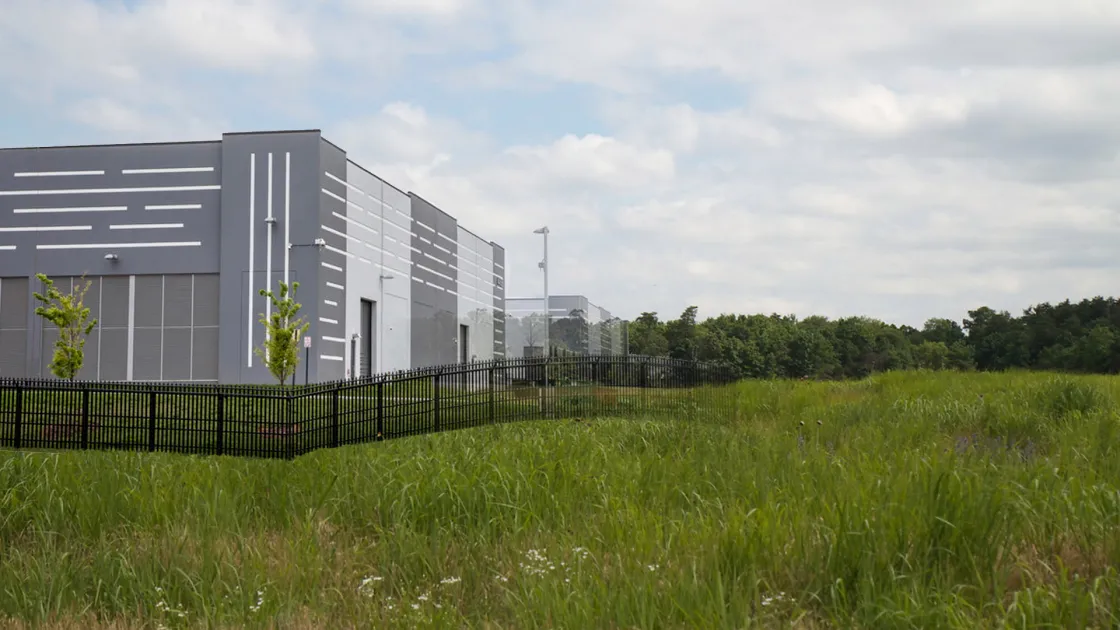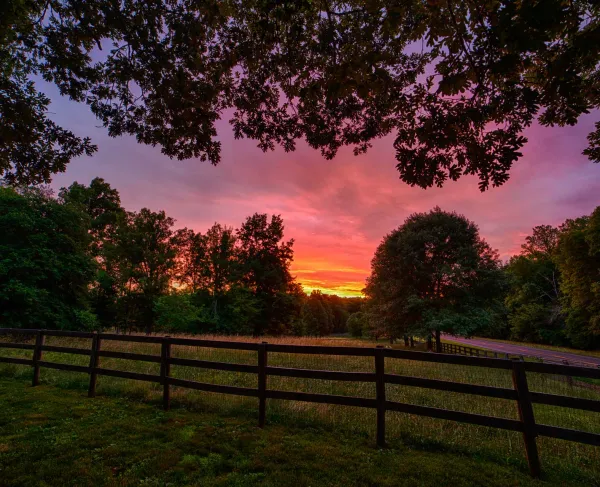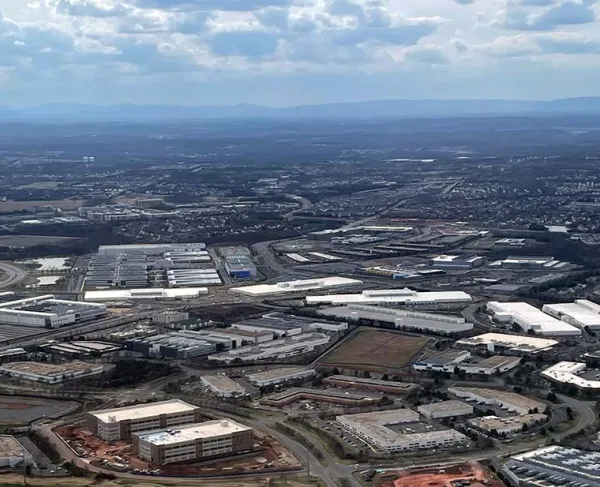Data Center Development and Historic Battlefields
When emerging technology meets historic landscapes
From its earliest origins, the battlefield preservation movement has had to contend with large scale development proposals that threaten historic landscapes. But whereas once those projects were subdivisions and strip malls, increasingly, we find that our opponents are deep-pocketed technology firms seeking to build hulking data center complexes. This represents an unprecedented threat to our historic landscapes, consuming land outright and pricing preservationists out of the real estate market.
It is important to remember that development and preservation need not be mutually exclusive. Thoughtful policy and land-use decisions can result in thriving communities that embrace technology and economic growth while respecting the unique historic and environmental resources that cannot be moved. The Trust and its allies strive for respectful negotiations that yield win-win solutions – but we are willing to fight when needed.
Situations at two battlefields, Manassas and the Wilderness, are so dire that the American Battlefield Trust is engaged in lawsuits to overturn rezonings and stop data center construction! And the Wilderness was placed on the National Trust for Historic Preservation's 2024 list of the country’s 11 Most Endangered Historic Places.

An Emerging Threat
Data centers are large industrial complexes of multiple buildings up to 100’ tall that function as the backbone of the modern cloud-based internet. They are often hulking, windowless structures built not to accommodate people, but the vast array of computer servers that power our web-enabled lives.
Globally, data centers consume more energy than the nations of South Africa or Egypt each year. Every day, a large facility (known in the industry as a “hyperscale”) requires as much water and power as a 25,000-person town to operate. Massive amounts of electricity keep the computers churning and provide the cooling – which in turn requires between 3-5 million gallons of water – needed to keep them humming.
Surrounding communities face significant issues from these types of new neighbors. Noise pollution is ubiquitous and concerns about water runoff and decreased water quality because of higher salinity are well-founded. Despite these and many other potential troubles, many jurisdictions are eager to embrace data centers because of easy tax revenue.
Read more research about these issues from the Trust’s partners at the Piedmont Environmental Council and the National Parks Conservation Association.
Many data centers are underwritten by the biggest companies on earth – Amazon, Meta and others for whom price is no object. They can pay exponentially more than the previous fair market value for a given parcel of land and groups like the Trust and the National Park Service can be easily priced out of desirable regions.
Virginia in the Bullseye
Data centers are a widespread threat to historic landscapes everywhere, but the situation is most acute in Virginia, thanks to a confluence of geography, state legislation and local zoning decisions. Put simply: The Old Dominion is the data center capital of the world, home to 35% of all hyperscale facilities. Even more striking, 70% of global internet traffic flows through Loudoun County alone.
As of the summer of 2024, the Trust is engaged with proposals for data centers on or adjacent to significant Virginia battlefields, including Brandy Station, Deep Bottom, Glendale, Manassas, North Anna, the Wilderness and more. At Manassas and the Wilderness we are engaged in lawsuits to overturn rezonings and stop data center construction.
And the trend is not slowing. Today, data centers account for more than a fifth of all electricity consumption in the state, but the regional transmission organization estimates that the peak summer load will double within 14 years, requiring massive and expensive upgrades to the grid – including substations and powerline corridors that will consume yet more battlefield land.
In 2023, Virginia’s disproportionate volume of data center development was recognized by the formation of the Virginia Data Center Reform Coalition. The coalition is made up of more than 25 environmental, conservation, climate, and historic preservation organizations, including the American Battlefield Trust, with the express mission of creating awareness among Virginia’s elected leaders of the damage that data centers are creating and to advocate for commonsense solutions in the Virginia General Assembly.
At the American Battlefield Trust, we recognize the necessity of data centers in our modern lives. But we believe that as part of the calculus in planning technological infrastructure, developers should collaborate with preservationists and local communities to protect historic resources.
American Battlefield Trust Lawsuits
In December 2023, Prince William County’s board of supervisors approved plans for the massive Digital Gateway complex, a data center campus in the narrow corridor between the western border of Manassas National Battlefield Park and Conway Robinson State Forest.
The Trust and nine citizens filed a lawsuit against the county Board of Supervisors and two tech companies in January 2024 to stop development of the 1,750-acre Prince William Digital Gateway. The lawsuit cites several legal violations committed by Prince William County as grounds to overturn the rezonings. They include: the lack of required information about the development; inadequate public notice and hearings; unlawful waivers of key analyses; submissions and approvals; failure to consider key environmental and historical facts; and unlawful delegation of rezoning power through failure to identify which of the more than 1,750 acres could be put to what uses.
On October 3, 2024, six leading conservation organizations committed to the preservation of the nation’s battlefields and natural resources filed an amicus curiae brief in support of the lawsuit to stop the Prince William Digital Gateway.
The friend-of-the-court brief was in the Circuit Court of Prince William County by the Coalition to Protect Prince William County, Piedmont Environmental Council, National Parks Conservation Association, Association for the Preservation of Virginia Antiquities, National Trust for the Historic Preservation in the United States and Coalition to Protect America’s National Parks.
However, on October 31, 2024, Prince William County Circuit Court Judge Tracy Hudson ruled that the case brought by the Trust and nine citizen plaintiffs against the Board of Supervisors and tech companies was insufficient to proceed to trial.
At this time, the American Battlefield Trust is pursuing options for appeal.
Further Reading on Data Centers
As data center construction escalates across the state, there is increased scrutiny on the industry. Watchdog groups, journalists and private citizens are asking tough questions about the literal and figurative toll that data centers are exacting from neighboring communities and whether their rates of water and energy consumption are sustainable.
In December 2023, the Trust was proud to join a new statewide effort calling for commonsense steps that will help ensure the Commonwealth takes a more comprehensive view of how this sector’s unchecked growth is impacting communities and cultural and environmental resources. The Virginia Data Center Reform Coalition is asking legislators to advance bills that provide meaningful oversight and reform of the data center industry and eagerly awaits the results of a robust study by the Joint Legislative Audit and Review Commission into these matters.
News Coverage of Data Center Issues
- Why the AI Industry's Thirst for Data Centers Can't Be Satisfied (Wall Street Journal)
- The Data Center Capital of the World is in Virginia (Governing.com)
- Thirsty Data Centers Are Making Summers Even Scarier (Bloomberg)
- Virginia Has a Data Center Problem (Virginia Mercury)
- Data Center Growth Threatens Virginia's Clean Energy Future (Duke Fuqua School of Business)
- Big Tech's New Headache: Data Center Activism (London School of Economics)
- Why Are Ratepayers Footing the Bill for Virginia's Data Center Buildout? (Virginia Mercury)
- Prince William data center adversaries rally as Digital Gateway hearing looms (InsideNova)
- Judge dismisses lawsuit challenging the PW Digital Gateway data center development (Prince William Times)









